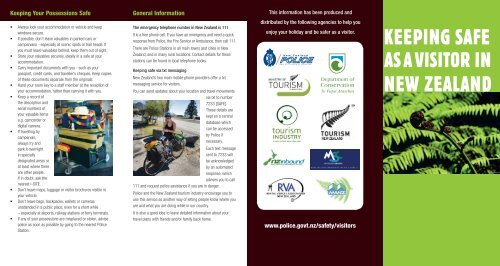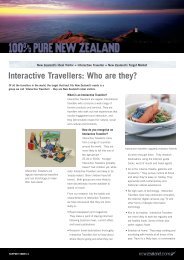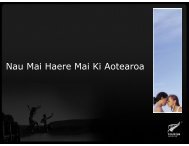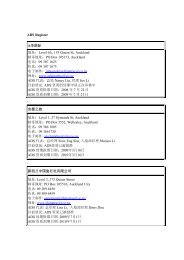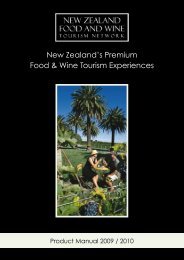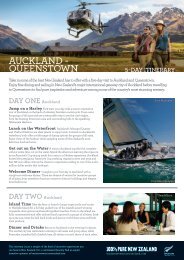Visitor Safety Brochure.indd - New Zealand
Visitor Safety Brochure.indd - New Zealand
Visitor Safety Brochure.indd - New Zealand
You also want an ePaper? Increase the reach of your titles
YUMPU automatically turns print PDFs into web optimized ePapers that Google loves.
Keeping Your Possessions Safe<br />
General Information<br />
This information has been produced and<br />
• Always lock your accommodation or vehicle and keep<br />
windows secure.<br />
• If possible, don’t leave valuables in parked cars or<br />
campervans - especially at scenic spots or trail heads. If<br />
you must leave valuables behind, keep them out of sight.<br />
• Store your valuables securely, ideally in a safe at your<br />
accommodation.<br />
• Carry important documents with you - such as your<br />
passport, credit cards, and traveller’s cheques. Keep copies<br />
of these documents separate from the originals.<br />
• Hand your room key to a staff member at the reception of<br />
your accommodation, rather than carrying it with you.<br />
• Keep a record of<br />
the description and<br />
serial numbers of<br />
your valuable items<br />
e.g. camcorder or<br />
digital camera.<br />
• If travelling by<br />
campervan,<br />
always try and<br />
park it overnight<br />
in specially<br />
designated areas or<br />
at least where there<br />
are other people.<br />
If in doubt, ask the<br />
nearest i-SITE.<br />
• Don’t leave maps, luggage or visitor brochures visible in<br />
your vehicle.<br />
• Don’t leave bags, backpacks, wallets or cameras<br />
unattended in a public place, even for a short while<br />
– especially at airports, railway stations or ferry terminals.<br />
• If any of your possessions are misplaced or stolen, advise<br />
police as soon as possible by going to the nearest Police<br />
Station.<br />
The emergency telephone number in <strong>New</strong> <strong>Zealand</strong> is 111<br />
It is a free phone call. If you have an emergency and need a quick<br />
response from Police, the Fire Service or Ambulance, then call 111.<br />
There are Police Stations in all main towns and cities in <strong>New</strong><br />
<strong>Zealand</strong>, and in many rural locations. Contact details for these<br />
stations can be found in local telephone books.<br />
Keeping safe via txt messaging<br />
<strong>New</strong> <strong>Zealand</strong>’s two main mobile phone providers offer a txt<br />
messaging service for visitors.<br />
You can send updates about your location and travel movements<br />
via txt to number<br />
7233 [SAFE].<br />
These details are<br />
kept on a central<br />
database which<br />
can be accessed<br />
by Police if<br />
necessary.<br />
Each text message<br />
sent to 7233 will<br />
be acknowledged<br />
by an automated<br />
response, which<br />
advises you to call<br />
111 and request police assistance if you are in danger.<br />
Police and the <strong>New</strong> <strong>Zealand</strong> tourism industry encourage you to<br />
use this service as another way of letting people know where you<br />
are and what you are doing while in our country.<br />
It is also a good idea to leave detailed information about your<br />
travel plans with friends and/or family back home.<br />
distributed by the following agencies to help you<br />
enjoy your holiday and be safer as a visitor.<br />
www.police.govt.nz/safety/visitors<br />
KEEPING SAFE<br />
AS A VISITOR IN<br />
NEW ZEALAND
Introduction<br />
Keeping Safe on <strong>New</strong> <strong>Zealand</strong> Roads<br />
Keeping Yourself Safe<br />
Keeping Safe Outdoors<br />
<strong>New</strong> <strong>Zealand</strong> is a relatively safe travel destination but<br />
we are not crime free.<br />
Just as you would in your home country, it’s important<br />
to look after yourself and your possessions while<br />
travelling around <strong>New</strong> <strong>Zealand</strong>.<br />
Try not to put yourself in unsafe situations, or leave your<br />
valuable possessions where somebody else could easily<br />
take them.<br />
<strong>New</strong> <strong>Zealand</strong> has a good roading system, but weather extremes,<br />
changes in terrain, and narrow secondary roads and bridges can<br />
make driving hazardous.<br />
Although <strong>New</strong> <strong>Zealand</strong> is a small country, it can take many hours to<br />
drive between cities and other destinations of interest.<br />
You should always be well rested before starting a long road trip.<br />
There have been serious crashes in <strong>New</strong> <strong>Zealand</strong> when people<br />
have attempted to drive while tired after a long-haul flight.<br />
During long journeys, take regular rest and refreshment breaks.<br />
Remember: a fatigued driver is an unsafe driver.<br />
The following general information is provided for your road safety:<br />
• Drive on the left-hand-side of<br />
the road and give way to your<br />
right.<br />
• Keep within the speed limits.<br />
Speed limits are rigorously<br />
enforced by Police.<br />
Rates of crime in <strong>New</strong> <strong>Zealand</strong> are lower than many other<br />
countries, but you can help keep yourself and others safe by<br />
following these simple tips.<br />
• Be aware and take notice of your surroundings and who’s<br />
around when out walking or sight-seeing.<br />
• Avoid walking alone in isolated places late at night. Stay in<br />
well-lit areas where there are other people. Take a taxi or<br />
arrange for someone you know to pick you up.<br />
• Don’t carry large amounts of cash or expensive jewellery<br />
with you. If you must carry valuable items, keep them close<br />
to your body.<br />
<strong>New</strong> <strong>Zealand</strong> is the perfect destination for all types of outdoor<br />
adventure and activity.<br />
However, the weather in <strong>New</strong> <strong>Zealand</strong> changes very quickly.<br />
This means an experience in our mountains and waterways can<br />
sometimes become extremely challenging. Intended short treks<br />
can be hazardous if you become injured, lose your way or the<br />
weather becomes unfavourable.<br />
<strong>Visitor</strong>s often get into difficulty because they over-estimate<br />
their ability, take unnecessary risks or aren’t prepared for the<br />
conditions.<br />
If you are planning to go into the forests, hills or mountains,<br />
lakes, rivers or sea, seek advice on the conditions first from local<br />
experts or information centres - such as Department<br />
of Conservation staff, an i-SITE information centre,<br />
Police or the Mountain <strong>Safety</strong> Council website<br />
www.mountainsafety.org.nz<br />
• Drive carefully according to<br />
the weather conditions.<br />
IN AN EMERGENCY CALL 111<br />
• Fixed and mobile speed<br />
cameras operate throughout<br />
<strong>New</strong> <strong>Zealand</strong>.<br />
• You are required by law to carry your driver licence with you at<br />
all times.<br />
• All vehicle drivers and passengers must wear a safety belt or<br />
approved child restraint at all times.<br />
• If you are cycling or motorcycling, cycle helmets and<br />
motorcycle helmets are compulsory.<br />
• Driving under the influence of alcohol or drugs is a crime.<br />
Police actively enforce it. Penalties are severe and your vehicle<br />
could be impounded in certain circumstances.<br />
• If you are driving a campervan, you will generally drive more<br />
slowly than other vehicles. Where it is safe, pull over to let<br />
other vehicles pass.<br />
• If using an ATM, only withdraw small amounts of cash -<br />
preferably during the day - shield your PIN number and be<br />
aware of people around you.<br />
• If you are in a bar, avoid accepting drinks from strangers,<br />
and don't leave your drink unattended. Remember, alcohol<br />
and drugs can affect your judgement.<br />
• If possible, go places with someone you know and trust.<br />
• Hitchhiking or accepting rides from people you don’t know is<br />
not recommended.<br />
• Carry a mobile phone with you and don’t hesitate to use<br />
<strong>New</strong> <strong>Zealand</strong>’s emergency phone number if you feel unsafe<br />
or threatened. Dial 111.<br />
Prepare well by taking suitable food and equipment. This will<br />
greatly improve your safety. Always take a waterproof top and<br />
warm clothing with you, even when good weather is forecast.<br />
Preferably do your activity with other people and ALWAYS tell<br />
someone where you are going and how long you intend to be<br />
away. Notify them if your plans change and of your safe return.<br />
If possible, take a mobile phone with you in a zip lock plastic<br />
bag. Be aware you are unlikely to get mobile coverage in many<br />
back country areas.<br />
An emergency personal locator beacon is a useful device to<br />
have with you if you find yourself in a life-threatening situation.<br />
However for two-way communications in remote areas contact<br />
the Mountain Radio Service www.nzlsar.org.nz/MRS/<br />
While enjoying the outdoors please don’t remove any plants, or<br />
other natural resources.


